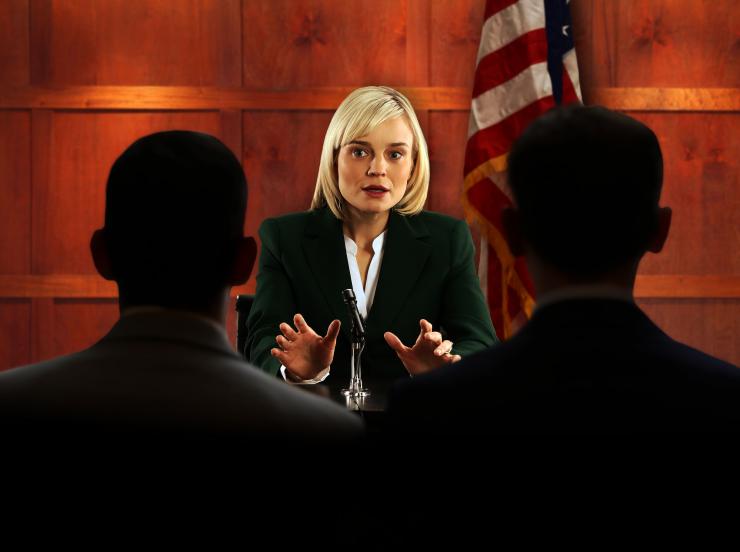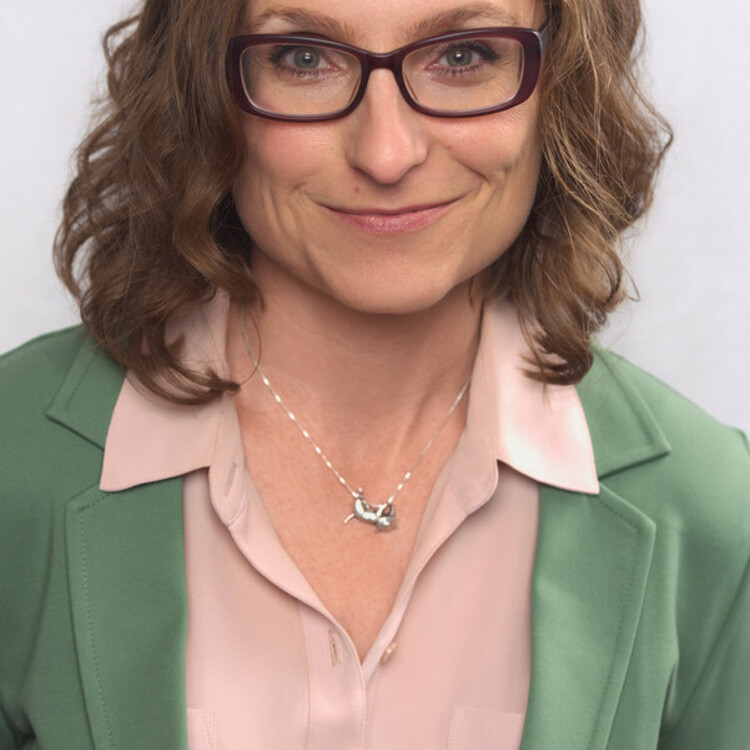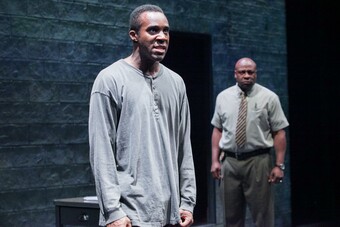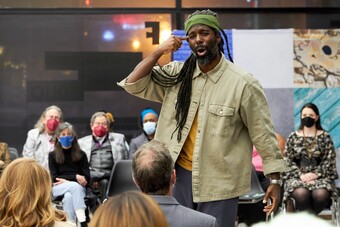Truthful Intelligence
A Play about Power and Politics
Exactly eight days after Donald Trump was elected president, Oxford Dictionaries selected “post-truth”—defined as “relating to or denoting circumstances in which objective facts are less influential in shaping public opinion than appeals to emotion and personal belief”—as 2016’s international word of the year, citing a 2000 percent increase in usage compared with 2015.
However, those of us who followed the second Bush administration closely became familiar with what Stephen Colbert called “truthiness” much earlier. The sixteen words George W. Bush used in the 2003 State of the Union address, for example, claiming that Saddam Hussein had sought “significant quantities of uranium from Africa,” could have been called a lie, but, given that Bush says he believed they were true when he spoke them, they have instead gone down in history as “contested.” As playwright Jacqueline E. Lawton explores in her new play Intelligence, the ensuing Plamegate scandal—involving the outing of covert CIA officer Valerie Plame—was full of its own deep truths not just about American politics but also about life in America at the time.
Lawton’s voice and the Power Plays in general may indeed prove a powerful antidote to the cacophony of voices emanating from the current White House, many of which contradict each other even while speaking on the same presumably factual basis, and most of which deliberately obscure truth by asking us to passively accept lies.
Intelligence is the third in Arena Stage’s Power Plays initiative—a ten-year plan to commission twenty-five plays, one for each decade of American history, about power and politics. Deputy Artistic Director Seema Sueko told me that the initiative was the result of Artistic Director Molly Smith “having her ears, eyes, and heart open to the heartbeat of Washington, DC, Maryland, and Virginia, and listening to what that heartbeat was saying.”
Our audiences were flocking to—hungry for—stories about politics and power in the whole diversity of how those are told—drama, musicals, all of that. These were the stories we were seeing our communities be inspired by. I think we’re all really hungry to understand who we are as Americans, in all of the delicious complexity, contradiction, beauty, and joy that that identifier can hold.
Lawton’s play is inspired by real events, but the truths she gets at are deeper than any literal retelling could uncover. She never spoke to Plame or her husband Joseph Wilson, the ambassador sent to Africa to determine whether Hussein really had attempted to acquire uranium there. (He had not.) Though historical events like Bush’s State of the Union and Secretary of State Colin Powell’s presentation to the UN are referenced, Lawton told me that she was primarily interested in what it is like to be a woman working in the CIA. Historical incidents, then, became the sparks that flamed her imagination:
I wanted it to be historical drama because I wanted to be able to dream, I wanted to be able to ask what if, what if. I wanted to be able to imagine all the different things that could possibly happen, and I wanted to have my say. I wanted to put myself in the story in as strong and powerful a way as possible. This was my opportunity to dream very big about what I want the world to look like.
As director Daniella Topol put it in an email, “The characters are surrounded by a constant swirl of news and clips of speeches that are the catalyst and the instigator of this drama, [while] the characters are very clearly Jacqueline’s creation and invention.”
For example, Lawton invented a boss who is an African-American woman, because just because there isn’t a high-ranking black woman at the CIA doesn’t mean there can’t be or shouldn’t be. She also created two Iraqi characters, a fashion designer and her uncle, the (fictional) former head of Iraq’s mobile weapons program, which Lawton says she uses to “show very intimately the immediate, devastating, and lasting impact that this war had on people on the other side of the world.”
To inform Lawton’s curiosity about what it’s like to be a woman at the CIA, Arena invited two real agents, Gina Bennett and Lindsay Moran, to attend performances during different points in the development process. Both of those women found that what resonated as truthful for them was what it is like to be a woman in a workforce composed mostly of men who, in the interest of national security, has to put her job before her family.

Sueko says whether a Power Play is closer to docudrama or historical fiction is up to the playwright, and that bringing in experts is something Arena is happy to use its positioning in DC to do. For another play in the series, Camp David, which dramatizes the thirteen-day meeting between President Jimmy Carter, President Anwar Sadat of Egypt, and Israeli Prime Minister Menachem Begin to work out what became the Camp David Peace Accords, playwright Larry Wright interviewed every surviving member of all three delegations and even secured access to Rosalynn Carter’s diary.
Lawton raves about the support she’s received from Arena, which is using the series to commission a diverse, inclusive, and equitable roster of playwrights:
It’s very exciting that as a woman of color and an unknown playwright, two weeks before we even went into rehearsal we extended. We are told in the American theatre that women’s plays don’t sell and that women’s plays are only for women audiences and that plays by people color are only for people of color. I hope playwrights and artistic directors stand up and take notice: We aren’t a negative risk. Invest in our stories. Audiences want our stories. They’re curious. They’re hungry to know how we’re viewing the world and what we can possibly show the world that they may not know because they might have a different way of seeing.
Sueko’s experience as a new resident of the DMV (the DC, Maryland, Virginia area) puts to the test the post-truth depiction of our nation’s capitol enumerated by President Trump in his inaugural address. While Trump claimed that DC, where “the establishment [has] protected itself, but not the citizens of our country,” is populated by an elitist cabal, reaping “the rewards of government while the people have born the cost,” Sueko has found that
Audiences here are really smart. They came to DC to change the world, and many of us who do theatre do it to change the world, too. My heart is so full of joy being here and being in this community of artists, arts advocates, audience members, and community members. There’s a life force here where people are striving to build a strong healthy society.
Lawton’s voice and the Power Plays in general may indeed prove a powerful antidote to the cacophony of voices emanating from the current White House, many of which contradict each other even while speaking on the same presumably factual basis, and most of which deliberately obscure truth by asking us to passively accept lies. Of her play, Lawton told me,
This is me being able to say, 'Citizens of this nation, you are responsible for upholding democracy. You are responsible for holding your leaders accountable for their actions and inactions. And it is your responsibility to call out lies when they occur and call out the truth. I strongly believe that with every ounce of my being.'
Artistic Director Molly Smith told me she thinks this is exactly what theatre is for:
This is a critical time to consider the motives of those who hold political power, and what an individual can do—or should do or is forced to do—to fight for justice. Theatre involves a search for truth and a critique of power—an invitation to conversation, not a shutting down of dialogue. Hearing American stories of politics and power over the decades makes us more informed as a democracy—and also can shed light on how we can come together as a nation to face personal and political adversaries.













Comments
The article is just the start of the conversation—we want to know what you think about this subject, too! HowlRound is a space for knowledge-sharing, and we welcome spirited, thoughtful, and on-topic dialogue. Find our full comments policy here
Excellent! I (as regular readers of my comments would probably guess) remember well Bush's lie (yes, lie!) about the uranium, and the subsequent outing of Valerie Plame, and am delighted (if amazed) that a play is being written about it!
Of course I just realized it probably wouldn't be happening if Bush (or, as I liked to call him at the time, the First Liar) was a democrat.
Which brings to mind quite an irony: In the most recent election cycle, of the dozen or more republicans and handful of democrats initially running, who was the only person to come out publically at a debate and state on live TV that Bush LIED about Iraq having weapons of mass destruction? (Hint: It wasn't a democrat.) Yep, the person that so many now despise: Trump.
I remember reading Wilson's op-ed in the paper. It was a very surreal moment. I also remember watching the beginning of shock and awe on television. Lawton told me one of the thing she's doing in the play is using technology to evoke how psychologically jarring those moments and others leading up to the war were. When a person with power blatantly lies like that and then says, "I didn't lie," it's totally disorienting.